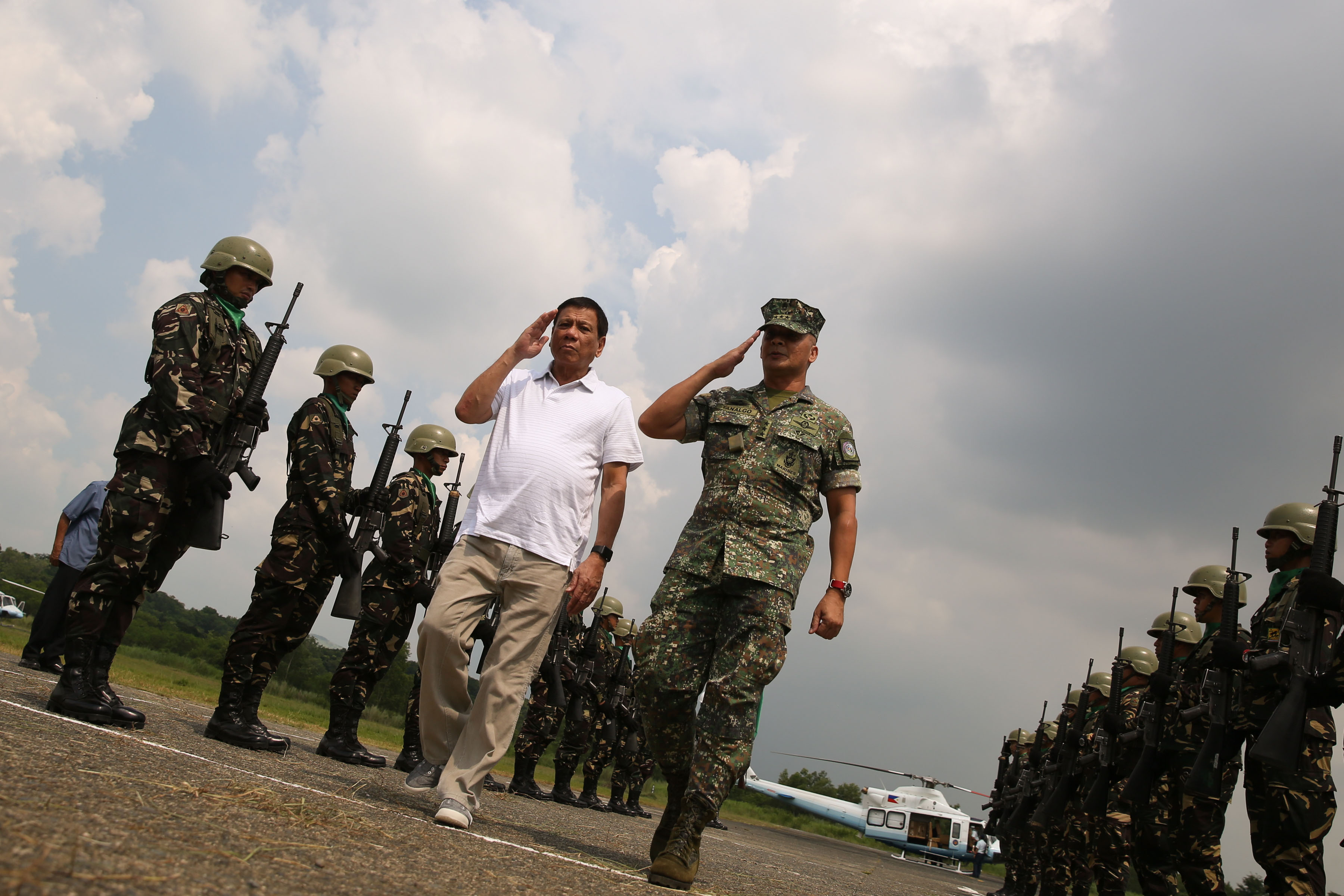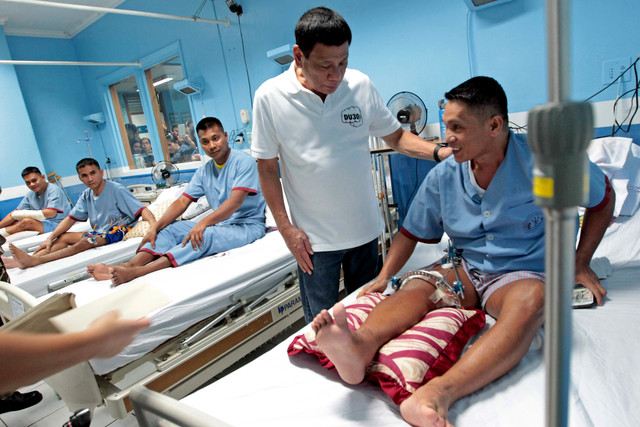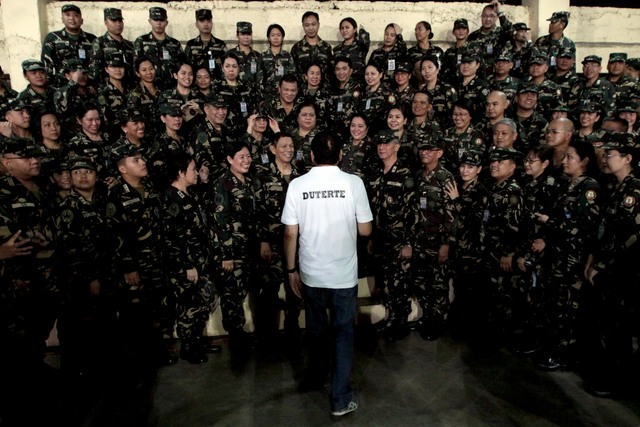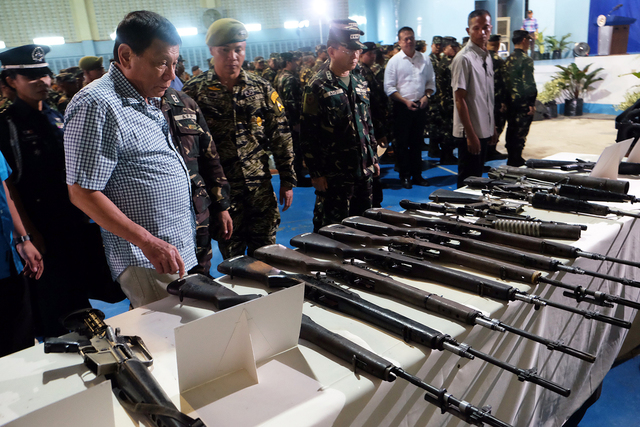Is it just to boost troops' morale? Is he appeasing the military as he releases communist rebels? Duterte's camp visits may be more than meets the eye.

In the past month, the public was more likely to see President Rodrigo Duterte in a collared shirt flanked by men in camouflage than in a barong accompanied by Cabinet secretaries.
Anyone who has watched his recent public speeches live will notice that most of them were given in the presence of soldiers, inside the covered court of a military camp.
From July 21 to August 12, or in less than a month, the President has visited no less than 14 military camps across Luzon, Visayas, and Mindanao.
Here is a complete list of these camps with the dates of his visit:
- Camp Teodulfo Bautista in Jolo, Sulu (August 12)
- Camp Major Cesar Sang-an (1st Infantry Division or Tabak Division) in Labangan, Zamboanga del Sur (August 10)
- Camp Edilberto Evangelista in Cagayan de Oro City (August 9)
- Camp Lukban in Catbalogan, Samar (August 8)
- Camp Panacan, Davao City (August 6)
- Camp Lapu-Labu in Cebu City (August 5)
- Camp General Macario Peralta in Jamindan, Capiz (August 5)
- Camp Victoriano Luna or AFP Medical Center in Quezon City (August 2)
- 60th Infantry Battalion headquarters in Asuncion, Davao del Norte (July 29)
- Camp Guillermo Nakar in Lucena City, Quezon (July 28)
- Fort Magsaysay in Palayan City, Nueva Ecija (July 26)
- Camp Siongco in Awang Datu Odin Sinsuat, Maguindanao (July 22 and August 18)
- Western Mindanao Command headquarters in Zamboanga City (July 21)
- 104th Infantry Battalion in Isabela City, Basilan (July 21)
No other president has dropped in on so many military camps in his first weeks in power.
In a previous article, written after his visit to 6 camps, I wrote about what he did and said during these visits.
The core of these trips were his speeches, delivered in front of hundreds of soldiers – from scout rangers to navy officers to army medical staff. Without fail, he would mention his promise to double their salaries, provide them with health facilities and emergency medical attention, and even give their children scholarships should they die in battle.

'CARING COMMANDER.' President Rodrigo Duterte talks to a soldier being treated at the AFP Medical Center on Tuesday, August 2, 2016. Photo by Robinson Ninal/PPD
He promised to give them all the equipment they need and to swell their ranks with 20,000 more soldiers.
In his bid for their loyalty, he vowed to defend them from all criminal charges and lawsuits. His speeches masterfully wove in the official with the personal as he addressed them both as their commander-in-chief and their caring, doting father.
It builds up troops’ confidence…The morale is high, there is so much hope. – Senator Gringo Honasan
This was indeed how he came across to some of the soldiers.
“Para ‘yang isang ama na bumisita sa mga anak, kinamusta ang kalagayan nila. ‘Anong kailangan mo? Paano mo mapapabuti ang gusto mong gawin?’ Sino ba naman ‘yung anak na hindi matutuwa sa ganoon?” Major Filemon Tan of the Western Mindanao Command based in Zamboanga City told me. (He is like a father who visited his children and asked about their condition. ‘What do you need? How can I help you do what you want?’ What child will not appreciate that?)
Sergeant Joecery Dukha of the Scouth Rangers in Camp Bautista in Sulu said Duterte’s promise of a salary hike was one of the most memorable parts of his speech.
“Medyo kuwan talaga, medyo mahirap-hirap din, medyo kulang din. Siyempre malaking tulong ‘yun sa amin,” he said. (It’s quite difficult because the salary is insufficient. Of course, the salary increase would be a big help to us.)
Duterte rarely arrived on time for these camp visits. For his August 2 visit to the AFP Medical Center, for instance, soldiers waited 7 hours for him.
But some soldiers apparently didn’t mind.
“Worth the wait. Masaya. Kahit 7 hours kami naghantay, masaya (Worth the wait. Even if we waited for 7 hours, we’re still happy),” said Staff Sergeant Ane Canales.
Staff Sergeant Gay Vergara said Duterte’s speech made her feel appreciated as a soldier.
“Nagustuhan ko ‘yung sisiguradihun niyang mararating sa amin kung ano dapat para sa amin. Parang naging top priority niya ‘yung health ng mga sundalo,” she said. (I liked what he said about making sure we get what we need. It’s like the health of the soldiers is his top priority.)
Western Mindanao Command Chief Lieutenant General Mayoralgo Dela Cruz, meanwhile, was struck by Duterte’s pronouncement in Sulu that he would send an air ambulance to a conflict area for even just one wounded soldier.
“‘Yun ‘yung gusto namin marinig. Nakaka-inspire. Ang masasabi ko lang, ‘yung morale ng mga sundalo, malaking bagay ‘yun,” he said. (That’s what we want to hear. It’s inspiring. All I can say is, it’s a big deal for the morale of the soldiers.)
Reason 1: Duterte’s duty to boost morale of troops
Why is Duterte taking all the trouble and time to fly to these military camps, some of which are in the most dangerous parts of the country?
For ex-military man and former vice-presidential candidate Senator Gringo Honasan, it’s part of the President’s duty as commander of the Armed Forces of the Philippines (AFP).
“It’s a normal course of duty and responsibility for the President to go around,” Honasan said.
“It builds up their confidence…The morale is high, there is so much hope,” said the senator.
Apart from inspiring confidence among troops, the visits could also be to boost Duterte’s own confidence in the military, an institution he is counting on to establish the peace and order he promised Filipinos.
“It’s to give him the confidence that the military will do its job, not because the President tells them to do so but because they are indeed the Armed Forces of the people,” added Honasan.

PEP TALK. President Duterte is mobbed by members of the Armed Forces of the Philippines (AFP) after delivering his speech at the AFP Medical Center on Tuesday, August 2, 2016. Photo by Robinson Ninal/PPD
Meanwhile, University of the Philippines political analyst Aries Arugay sees these visits as a “getting-to-know-you” of sorts.
Duterte, unlike the other presidential candidates of the last elections, was never a national government official. His ties with the military were limited to troops in Davao or Mindanao.
“He is not adopted into military classes like [Jejomar] Binay or [Francis] Escudero. He has no links with the military apart from his links as Davao mayor,” said Arugay.
To command the loyalty of the military is a must for any president, especially a president like Duterte who has made peace and order among his central promises to the people.
No one understands how crucial military support is to the highest official of the land than Honasan who, in 1986, was among the military officers who planned a mutiny against the dictatorship of former President Ferdinand Marcos.
In terms of territorial structure, only the Catholic Church can rival the structure of the military.– Political analyst Aries Arugay
Later on, Honasan would lead a series of unsuccessful coup attempts against President Corazon Aquino.
Why is the ability to control the military so important to a president?
“Because they have guns,” said Honasan. “They’re authorized to have guns which is tremendous power, coercive power.”
He recalled the days of Martial Law in which the military and police were the primary arms through which Marcos wielded his power over civilians.
“The government then had a preponderance of coercive power. They thought they had the police and military on their side,” said Honasan.
It was only when the military rebelled against Marcos that the “fulcrum shifted” and brought about “balance” to the power play, he said.
Commanding the loyalty of the military is the ultimate clincher in any power grab attempt.
Former President Joseph Estrada’s lack of this support made it easier to oust him, said Arugay.
“That was Erap’s error. He trusted people too much and if you abide by a credo of political survival, you must make sure the institutions of coercion are on your side,” said Arugay.
Duterte, who has not only survived but thrived in his 3 decades as a politician, could just be making sure he has all his bases covered.
Reason 2: Preparation for authoritarian regime?
Curiously enough, it’s Duterte himself who has brought back the specter of Martial Law after he threatened the judiciary with it should his war on drugs be hindered.
These threats makes one wonder if there’s more to these military camp visits than meets the eye.
Senator Antonio Trillanes IV, an outspoken critic of Duterte, has dire pronouncements about these camp visits.
The strategy of consolidating military support as a power base mirrors that of certain Latin American leaders like former Venezuelan President Hugo Chavez who during his presidency curtailed some democratic freedoms and sought to rewrite his country’s Constitution.
“The first thing they did is to get the support of the Armed Forces and the next thing they did was to tinker with the Constitution so they can perpetuate themselves in power,” said Trillanes.
Other ways Duterte is following the “Hugo Chavez template” is with his “populist, anti-elite, anti-establishment, and even anti-American rhetoric,” added the senator.

INSPECTION. President Duterte inspects the firearms recovered from the New People's Army (NPA) rebels during his visit at Camp Edilberto Evangelista in Patag, Cagayan de Oro City on August 9. Photo by Kiwi Bulaclac/PPD
While Trillanes, himself a former Navy officer who also mutineed against the government, agrees that Duterte’s camp visits have boosted troops’ morale, he cautioned the military against believing Duterte’s words.
“They tend to accept or believe you or see you at face value. So they are holding on to the word of their commander-in-chief. So far they have been inspired, their morale is very high. That’s where the danger lies,” he said.
Once Duterte has total control of security forces, Trillanes believes he will use them “against dissenting voices, whether it be media, civil society, the Senate, political opposition.”
But for Honasan, who used to be Trillanes’ mentor, such theories are pure “speculation.”
“Difficult to validate. Speculation. Conspiracy theory – the worries that we inflict on ourselves. How many variables do you need to put together that theory?” said the senator.
Judging from Duterte’s own words, it seems the President is “in a hurry to leave” his post – vastly different from the power-drunk Marcos.
The AFP is technically a political weapon. If you put it in the wrong hands, we will have a big problem.– Senator Antonio Trillanes IV
Honasan recalled that Duterte himself said he would leave the presidency if the shift to federalism is achieved and new elections held.
But Trillanes thinks these pronouncements are just theatrics to make the public complacent.
“Remember, he said categorically during the [candidacy] filing that he doesn’t intend to run for president but eventually he did. He has a tendency to speak with a forked tongue,” he warned.
Arugay thinks such a plot is possible but it may be too early to tell Duterte’s true intentions.
“It’s possible though I don't see it right now. But if you are the president and you are a strategist which I think Duterte is, you will not make known your possible moves,” said Arugay.
Reason 3: Appeasing the military amid release of communist rebels
Yet another objective of Duterte’s may be to calm down the military as he releases communist rebels to build confidence for the peace talks his government is pursuing with the Left, said Trillanes.
As of August 19, the Philippine government has temporarily released 17 rebels so they may join peace talks in Norway from August 22 to 26. The released include top New People’s Army leaders Benito Tiamzon and wife Wilma.
Peace Process Adviser Jesus Dureza said Duterte intends to declare general amnesty for all communist rebels if the peace talks are successful.
Neglecting the military who risked their lives to apprehend these communist rebels would have been careless of Duterte.
“Let’s just say a segment of the Armed Forces would not be comfortable seeing these communist leaders released again after the sacrifices they went through in affecting their arrests…To avoid the scenario, he might as well court their support through these visits,” said Trillanes.
The same communist rebels tasting freedom under the Duterte administration may have killed Philippine soldiers. If Duterte did not take the time to address the soldiers, he would have heard some “grumblings”.
Likely, this is one reason why he takes time during his speeches to emphasize the importance of the government’s peace talks with the Left.
“My job as president is to seek peace, not to declare war,” he would say.
Reason 4: Gearing up the military for the war on drugs, confrontation with China
As Trillanes points out, catching drug lords is not within the “traditional mandate” of the military.
But with Duterte eager to pull out all the stops to “destroy the drug apparatus,” it’s not surprising he wants to deploy the military as well.
The reach of the military and its physical presence across the nation is a definite advantage for quelling the nationwide “drug menace.”
“Wherever you are in the country, there is a military structure. In fact, in terms of territorial structure, only the Catholic Church can rival the structure of the military, so it has a wide reach. If you have a nationwide campaign against crime and illegal drugs, you would want to take advantage of the military, logistics, assets, training, software, and hardware,” said Arugay.
Trillanes believes Duterte has darker motives.
“That way, the Armed Forces can get used to getting deployed by Duterte in other missions outside their traditional mandate and by doing so he could eventually shift or line up other missions that would suit his political objectives,” said Trillanes.
Duterte has time and again declared that war with China is not an option for the Philippines.
But his casual, even humorous mention of the maritime dispute with China, indicates it’s on his mind when he speaks to troops.
“We have a tense regional strategic environment right now and he knows this. He says, jokingly, China might invade us…The deeper meaning here is that he is aware that the current strategic environment is tense. He is aware that he needs to have the military ready and able to fulfill the function of territorial defense from external aggression if necessary,” said Arugay.
A mission to inspire the loyalty of the armed forces is expected of Duterte. But Duterte should not forget the military itself is composed of groups and individuals with independent motives and ways of thinking.
This is proven by the examples of Trillanes and Honasan, two coup plotters.
“The problem is there is no assurance of military loyalty because the military is also factionalized, it’s not a cohesive institution,” said Arugay.
Honasan said most soldiers would know when to stop obeying their president.
“When the commander-in-chief and president stops serving the interests of the people who he is mandated to protect, then the military, as a matter of principle is not bound anymore to follow him, he stops being commander-in-chief. That’s why ’86 happened,” he said.
Trillanes, one of the leaders of the Oakwood mutiny against the Arroyo administration, warned of the consequences should power over the military be abused.
“The AFP is technically a political weapon. If you put it in the wrong hands we will have a big problem,” he said.
Honasan is more hopeful amid the possibility that Duterte’s professed good intentions are just distractions from an insidious motive.
“I hope President Duterte will be good for the country. When I begin to determine in my heart – where my moral compass is – that this is theatrics, then I will change my mind. But until that happens, I want to help.”

No comments:
Post a Comment
Note: Only a member of this blog may post a comment.